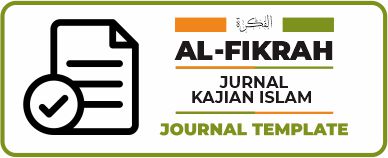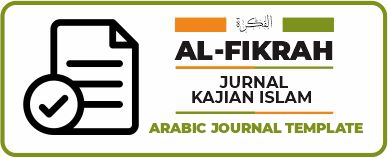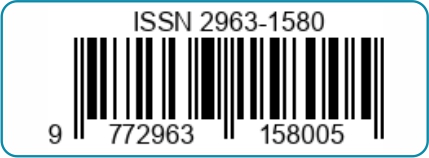Hukum Suara Kedua setelah Imam Perspektif Empat Mazhab
The Second Sound Law after the Imama Perspective of The Four Schools of Thought
DOI:
https://doi.org/10.36701/fikrah.v1i1.1648Keywords:
Law, Second Voice, Imam, Schools of Thought, Congregational PrayerAbstract
This study aims to examine the concept of the second voice after the imam and the law of the second voice after the imam from the perspective of the four schools of thought. The research method used is library research, which involves collecting data through literature studies from various sources such as the Qur'an, hadith, books, scientific articles, journals, and other literature. The data used is qualitative, with a normative juridical approach, which is a research method based on collecting and analyzing library materials related to the problem being studied. Data analysis is conducted qualitatively using deductive techniques, analyzing data from general principles applied to specific cases. The study results show that the second voice after the imam, or tabligh, has been prescribed since the time of the Prophet Muhammad saw especially in situations where the imam's voice is not loud enough to be heard by the congregation. The four schools of thought have different views on the law of the second voice after the imam. However, in general, they agree that the second voice can be performed by the congregation to convey the imam's voice to others. This study also found that in the practice of congregational prayers, the role of the mubalig (announcer) is crucial when the imam's voice is not heard by the congregation, even though there is now technology like loudspeakers. The conclusion of this study emphasizes that the law of the second voice after the imam has a strong basis in Islamic law and remains relevant, considering the conditions and needs of the congregation. This research provides significant insights into the perspectives of the four schools of thought on the second voice after the imam and its implications for the practice of congregational prayers today.
Downloads
References
Al-Qur’a>n al-Kari>m
Buku:
‘A>bidin, Muhammad Amin bin Umar bin Abdul Aziz. Radd a l-muhta>r. Bairu>t: 1386 H/1966 M.
‘A>bidin, Muhammad Amin bin Umar bin Abdul Aziz. Majmu’at Rasail bin‘A>bidin, [t.d.]
‘Alī, Abdullah Sya’bān. Ikhtilāfāt al-‘Ulamā’ fi Fahmi al-Sunnah, Bairu>t: Dār al-Kutub al- ‘Ilmiyyah t.th.
Al-Ans}a>ri, Isma>il. Al-Ilma>m bi Syarhi Umdatu al-Ahka>m, Mesir: Mut}ba’atu al-Sa>’adah, 1392 H 1976 M.
Al-Asyqar, ‘Umar Sulaimān. al-Madkhal ilā Dirāsah al-Madāris wa al-Mażahib al-Fiqhiyyah, Cet. II; Yordania: Dār al-Nafāis li al-Nasyri wa al-Tawzī’i, 1418 H/1998 M.
al-Bagawī, Abū Muḥammad al-Ḥusaīn bin Mas’ūd bin Muḥammad bin al-Farrā’. Al-Tahżīb fī Fiqh al-Imām al-Syāfi’ī, Cet. I; t.t.p.: Dār al-Kutub al-‘Ilmiyyah, 1418 H/1997 M.
Al-Baihaqī, Abū Bakr Aḥmad bin al-Ḥusaīn. Manāqib al-Syāfi’ī, Cet. I; Kairo: Maktabah Dār al-Turāṡ, 1390 H/1970 M.
Ba>z, Abdul Aziz bin Abdullah bin Abdul Rahman bin. Majmu' Fatāwā wa Maqālāt Mutanawwi'ah, Riya>d; Ri'āsah Idārah al-Buḥūs| al-ʿIlmiyyah wa al-Iftā' bil-Mamlakah al-ʿArabiyyah al-Suʿūdiyyah t.th.
Al-Dasūqī, Muhammad bin ʿArafa. Hāshiyah al-Dasūqī ʿalā Mukhtaṣar al-Maʿānī li-Saʿd al-Dīn al-Taftāzānī, Bairu>t, Al-Maktabah al-ʿAṣriyyah t.th.
Al-Dauri, Qaht}a>n Abdu al-Rahma>n. Mana>hiju al-Fuqaha> Fi> Ist}inba>ti al-Ahka>m Wa Asba>bi Ikhtila>fihim, Cet I; Lebanon: 1436 H.
Al-Dimasyqi>, Al-Hafiz} 'Ima>d al-di>n Abul Fida' Isma>'il bin Kaśi>r al-Qurasyi>. Tafsir al- Qur'a>n al-Azhim, Bairu>t: Dâr al-Turaś al-'Arabi t.th.
Al-Di>n, Abdullah bin Muhammad bin Quda>ma Al-Jumaili Al-Maqdi>si, Al-Dimasyqi> Al-Hambali, Abu Muhammad, Muwaffaq. Al-mugni, Bairu>t: Da>r Alam al-Kutub, 1417 H/ 1997 M.
Farhu>n, Ibra>him bin. al-Di>baj al-Mazhab li al-Tib’I Wa al-Nasyr, Cet. I; Kairo: Da>r al-Tura>s, 1965 M.
Al-Hajja>j, Abu al-Hasan Muslim bin. S}ahih Muslim, Bairu>t: Da>r Ihya>’ al-Turas| al-‘Arabi,> t.th.
Al-Ḥanafī, Abū Muḥammad Maḥmūd bin Aḥmad bin Mūsā bin Aḥmad bin Ḥusaīn al-Gītābī. Mugānī al-Akhyār fī Syarhi Asāmī Rijāl Ma’ānī al-Āṡār, Cet. I; Bairūt: Dār al-Kutub al-‘Ilmiyyah, 1427 H/2006 M.
Al-Jazīrī, Abd al-Raḥmān bin Muḥammad ʿAwad., Al-Fiqh 'ala> al-Maza>hib al-Arba'ah, Bairu>t: Dār al-Kutub al-ʿIlmiyyah t.th.
Al-Jawzī, Jamāluddīn Abū al-Faraj ‘Abdurraḥmān bin ‘Alī bin Muḥammad. Manāqib al-Imām Aḥmad, Cet. II; t.t.p.: Dār Hajar, 1409 H/1988 M.
Al-Jawziyah, Muḥammad bin Abī Bakr bin Ayyūb bin Sa’ad Syamsuddīn bin Qayyim. I’lām al-Muwaqqi’īn ‘an Rabb al-‘Ālamīn, Cet. I; Bairūt: Dār al-Kutub al-‘Ilmiyyah, 1411 H/1991 M.
Kementerian Agama RI, Tuntunan Penggunaan Pengeras Suara di Masjid dan Mushala, Jakarta: Ditjen Bimbingan Masyarakat Islam Departemen Agama, 1978.
Al-Lahi>mi>d, Sulaima>n bin Muhammad. Duru>s fiqhiyah fiqih ka>mil, [t.d.]
Mukram, Muhammad bin. Lisa>nu al-‘Arab, Bairu>t: Da>r S|a>dir 1414 H
Al-Nawawi, Abu Zakariya> Muhyiddin bin Syarif. Al-Majmu' Syarh al-Muhaz|z|ab, Mesir, al-Tadamu>n al-Akhawi 1347 H.
Al-Sa'di, Abdul al-Rahman bin Na>sir. Majmu'a>t Mu'allafa>t Bin Sa’di, t.d
Sa>biq, Sayyid. Fiqih al-Sunah, t.t.Da>r al-Fikr, 1389 H/1969 M.
Sa>lim, ‘Atiyyah bin. Syarhu bulug al-Mara>m t.d
Syarifuddin, Amir. Kebukuan Ijtihad, Jakarta: Ciputar Press, 2002.
Taimiyah, Ahmad bin Abdu al-Ha>lim bin Abdu al-Sala>m bin. Al-Fata>wa> Al-Kubra>. Cet. I: Da>r al-Kitab al-Ilmiyah, 1408 H/1987 M.
Tibraya, Achmad. Menyelami Seluk Beluk Islam, Jakarta: Prenada Media, 2003.
Al-'Usaimīn, Muhammad bin Sa>lih bin Muhammad al-'Usaimīn, Majmū' Fatāwā wa Rasā'il. Da>r al-Wat}an, 1413 H/1992 M
Al-Wansyari>syi, Ahma>d bin Yahya>. Al-Mi’ya>r al-Mu’rab wa al-Jami’ al-Mugrib, Bairu>t: Da>r al-Garb al-Islami, 1981.
Al-Yaḥṣubī, Abū al-Faḍl al-Qāḍī ‘Iyāḍ bin Mūsā. Tārtīb al-Madārik wa Taqrīb al-Masālik, Cet. I; Muḥammadiyah: Maṭba’ah Faḍālah, 1384 H/1965 M.
Al-Żahabī, Syamsuddīn Muḥammad bin Aḥmad bin Uṡmān. Siyar A’lām al-Nubalā’, Cet. III; t.t.p.: Muassasah al-Risālah, 1405 H/1985 M.
Zahrah, Muḥammad Abū. Mālik Ḥayātuhu wa Asruhu wa Arāuhu wa Fiqhuhu, Cet. II; Mesir: Dār al-Fikr al-‘Arabī, 1952 M.
Jurnal Ilmiah:
Hidayat, Darmawan dan Achmad. “Implikasi Pengaturan Pengeras Suara (Toa) Terhadap Hukum Masyarakat Yang Berbasis Agama”, Al-Shahifah 2, 2022.
Mahmud, Aqbar, Khaerul, Sulkifli Herman, and Muhammad Ichvan. "Tinjauan Wakaf Saham dalam Perspektif Hukum Islam." BUSTANUL FUQAHA: Jurnal Bidang Hukum Islam 3.1 2022.
Skripsi:
Pajri, Enung Nurul. ” Hukum Membaca al-Fatihah Dibelakang Imam Menurut Pendapat Imam Malik dan Imam al-Syafii”, Skripsi. bandung: Fak. Syariah dan Hukum UIN Sunan Gunung jati.
Wargono, Ahmad Riyandi. “Penggunaan Pengeras Suara Untuk Kegiatan Ibadah: Studi Atas SE. 05 Tahun 2022 Tentang Pedoman Pengeras Suara di Masjid dan Musolla Dalam Perspektif Hukum Fiqh dan Positif”, Skripsi. Jakarta: Fak. Syariah dan Hukum UIN Syarif Hidayatullah.
Situs Online:
http://www.toa.jp/profile/outline.html
Surat Edaran Menteri Agama Nomor 05/2022 Tentang Pedoman Penggunaan Pengeras Suara di Masjid dan Mushola










